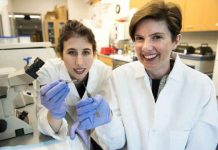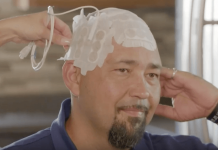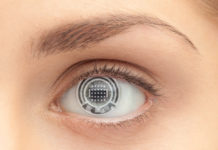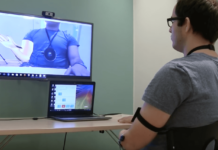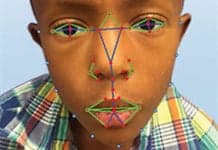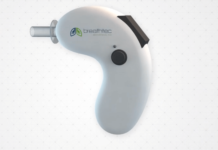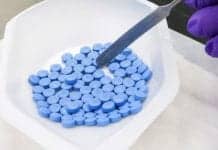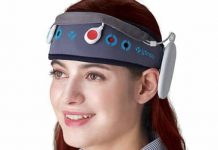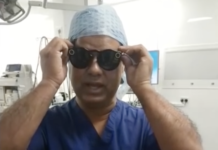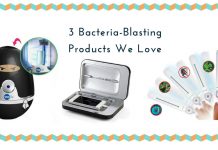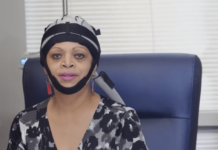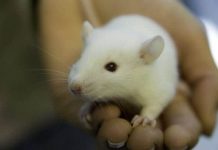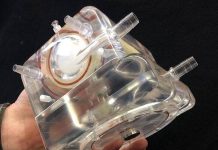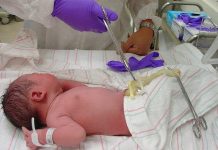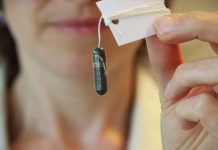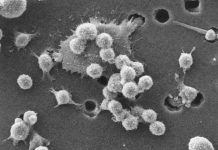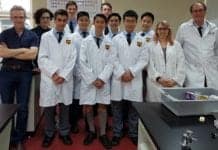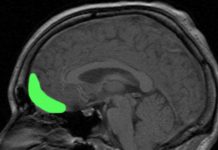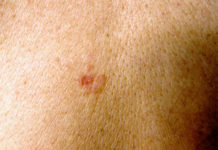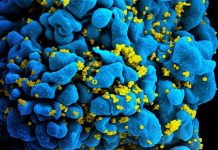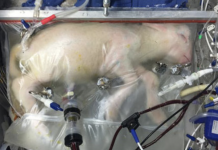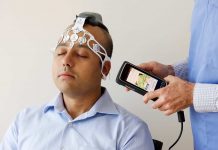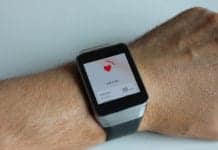3D-Printed Patch Can Heal Hearts
The 3D bioprinting allows for the patch to be a close match to heart tissue structure.
3 Eye Makeup Products That Will Make Your Life Easier
From magnetic eyelashes to stamp-on eyeliner, these products are the answer to eye makeup application struggles.
Artificial Blood Powder Could One Day Save Lives
Researchers have figured out a way to make artificial blood, and all it takes is mixing up water and small bag of powder.
Cancer-Fighting Cap Nearly Doubles the Survival Rate for Brain Cancer
The cap, called Optune, can be worn while patients go about their daily tasks and works by sending alternating frequencies to the brain.
ALS Patient Designs Home He Controls With His Eyes
The home uses a wireless signal that allows Steve Saling and other patients to open and close doors, call an elevator and operate TV and lights.
Toddler Receives Life-Saving Surgery to Remove Rare 5-Pound Facial Tumor
At only 3 years old, Melyssa Delgado Braga’s face was being consumed by myxoma, a rare yet aggressive facial tumor.
Researchers Are Developing Contact Lenses that Can Detect Disease
With bio-sensing contact lenses that can assess blood glucose levels, the researchers hope to improve health outcomes by replacing older, painful methods of diabetes monitoring.
Virtual Reality Could Help Amputees Deal With Phantom Pain
The phantom pain that often plagues amputees has remained something of a mystery, but a new treatment shows promising results for reducing the pain.
New Chewing Gum May Detect Cancer
The gum detects “volatiles” within saliva as it’s chewed and is then studied to find if the chewer produced chemicals associated with cancer.
Brain Cells Actually Favor One Parent’s Genes Over the Other
The new study adds a wrinkle to the current understanding of genetics and may hold the answer to the cause and incidence of some brain disorders.
New Facial Recognition Technology Can Detect Rare Disease
Diagnosing a rare disease in children called DiGeorge syndrome may be as simple as taking a photo with new facial recognition software.
This Breathalyzer Could Be Used to Detect Diseases, Cancer
The technology of breathalyzers has progressed, from detecting the amounts of alcohol in someone’s blood, to now — diagnosing illness.
This Weight Loss Drug May Reduce Opioid Cravings: Study
Lorcaserin is a prescription weight loss pill that works by altering the brain’s serotonin circuitry, and now it's been shown to reduce opioid cravings in animal tests.
New C-Section App May Shorten Hospital Stays for New Mothers
The helpful and cost-effective app was designed with the goal of empowering and informing women who are scheduled to undergo a C-section.
New Headband Technology From South Korea Aims to Treat Depression
This new type of treatment does not try to lessen symptoms, but rather cure depression itself.
Doctor Uses Snapchat Spectacles During Surgery to Create Tutorial
A doctor at the London Independent Hospital recorded a routine hernia repair surgery with a pair of Snapchat Spectacles.
3 Bacteria-Zapping Products for the Home
To truly protect yourself, it’s time to give your cleaning ritual an overall tech upgrade.
His and Her Genes Reveal Key Differences in Our Bodies
The researchers noticed marked differences among some genes based solely on whether the genes were in a man or woman’s body.
Enzyme Found in Baker’s Yeast Could Help Treat Leukemia
Researchers say that yeast-derived L-asparaginase may be a safer, more effective treatment for acute lymphoblastic leukemia.
11-Year-Old Girl Invents Her Own Glittery Prosthetics
Jordan Reeves' limb difference isn't slowing her down; she's embracing her unique condition by raising awareness for other children with limb differences and even designing her own 3D prosthetics.
Scalp-Cooling Caps May Prevent Hair Loss for Cancer Patients
A new scalp-cooling system may stop hair loss for women undergoing chemotherapy for breast cancer.
Scientists Engineer Super-Intelligent Mice via Gene Suppression
The researchers believe their findings may hold implications for the treatment of cognitive disorders in human beings.
Frog Slime May Protect Against Deadly Flu Strains
The discovery of a peptide in the frog slime is a potentially important one to global public health.
Computer-Based Therapy Helps College Students Drink Less
For college students who routinely go on binge drinking sprees, a new computerized interface may help curb the dangerous behavior.
Researchers from Brown University School...
This Artificial Lung Can Fit Inside a Backpack
The artificial lung is small enough to be carried in a backpack and is the first of its kind to actively drive up the patient's oxygen levels.
Umbilical Cord Blood May Boost Memory and Learning
Researchers from the Stanford University School of Medicine identified a specific protein in the plasma of umbilical cord blood that increased cognitive functioning in animal studies.
Researchers Create ‘Pill-on-a-String’ Technique to Better Detect Cancer
The unique technique can rub the esophagus and scrape away cells that scientists can then examine for cancer.
Antioxidant in Broccoli Holds Promise as Diabetes Treatment
The new study adds compelling evidence that the extract can combat the growing rates of diabetes worldwide.
Can Setting Off Nano Explosions Within the Body Kill Cancer Cells?
By tapping into the body’s cellular functioning, the nanoparticle method can act in a way that doesn’t promote a defensive response from fast-growing cancer cells.
Australian Students Recreate ‘Pharma Bro’ Shkreli’s Price-Hiked Drug
Students in Australia might be giving Martin Shkreli, the pharmaceutical executive once dubbed “the most hated man in America,” a run for his money.
Memory Implants? New Research Could Make Them Possible
Successful tests on rodents showing the possibility of implanting memories are paving the way for the first memory implants for humans, which could help people overcome memory-deficit disorders.
Elephants May Hold the Key to Curing Cancer
Less than five percent of elephants get cancer in their lifetime, and an abundance of a cancer-fighting protein in their genetic makeup is likely the reason why.
Parkinson’s Disease May Not Start With the Brain
The discovery of a protein in the gut provides a previously unrecognized origin of where changes to the same protein in the brain could happen.
New Utensil Gives People With Disabilities More Control at Mealtime
Liftware Level is a specially designed utensil to help people with hand tremors and other mobility conditions.
Chronic Pain Can Stop, Study Says
A new animal study shows how chronic pain starts and where it can end.
Obsessive-Compulsive Disorder Strongly Linked to Brain Inflammation
The discovery is a major breakthrough in understanding the biology of OCD.
Glass Batteries Could Soon Power Our Devices
The man who helped to invent the lithium-ion battery has now introduced a more efficient, fast-charging glass battery that could soon make its way to market.
‘Automated Dermatologist’ May Detect Skin Cancer With Same Accuracy as Real Doctors
The research team developed a deep learning computer system — or an algorithm-based technique — that could identify skin cancer at just a glance.
Scientists Create Topical Drug That Tans Skin
Scientists have developed a topical drug that darkens skin pigmentation without the sun's rays.
Virtual Reality Creates 3D View of Babies in the Womb
For parents who want to know more about what their unborn child does in the womb, a new technology could help that desire become a reality.
HIV Epidemic May Come to an End by 2025, Predicts Study
Current goals in place that seek to reduce new yearly infections to 12,000 cases in the U.S. by 2025 are already showing signs of success.
New Artificial Womb May One Day Save Premature Babies
A newly-tested artificial womb could save babies born extremely prematurely, according to a study published in journal Nature Communications.
New Brain-Scanning Device Can Detect Bleeding After Trauma
The new head-scanning device can detect brain bleeding with 97 percent accuracy.
‘Sickbit’ App Aims to Detect Illness 24 Hours in Advance
The idea behind this wearable device is that if most people had a half day notice that illness was imminent, they could better plan for the sickness and ultimately their recovery.
Lab-Grown Mini Brains Shed Light on Autism
The researchers wanted to find out whether they could pinpoint changes in brain activity between the mini brains they created, which retained characteristics of a living, human brain.
Fitbit Saves Woman’s Life by Revealing Deadly Condition
A woman from Connecticut noticed her Fitbit was tracking her unusually high heart rate, and this data ended up revealing a life-threatining condition.
Drug Therapy Suppresses Inflammation to Reduce Heart Risk
The researchers tested several different doses of a powerful anti-inflammatory drug on a group of about 10,000 study participants, with the doses ranging from low to medium to high.
At-Home DNA Test Can Reveal Risk for Hereditary Conditions
The newly FDA-approved test can analyze one's predisposition for certain hereditary conditions, like celiac disease and Alzheimer's.
Komodo Dragon Blood Could Be Used to Fight Infections
Komodo dragons possess antimicrobial saliva and blood, a discovery that could have broader implications for fighting infections in humans.
Mussel Secretions May Help Reduce Scars
Researchers created a mussel-based glue that also led to a healthier functioning of skin cells after a wound had healed.


